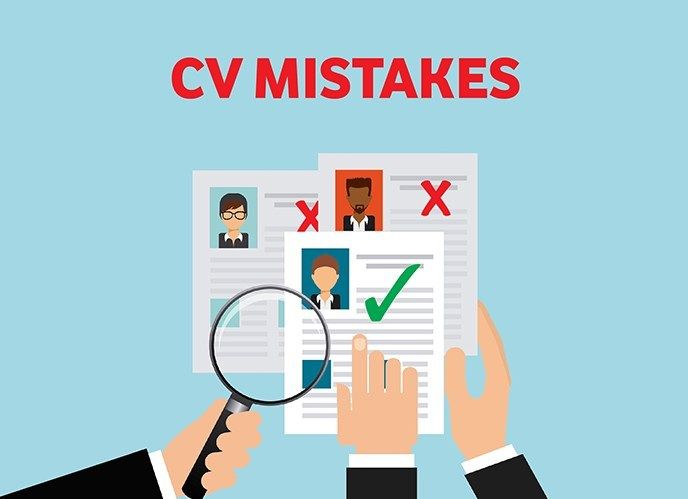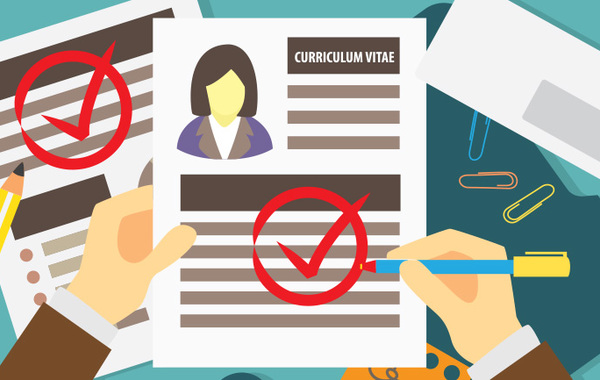The Most Common CV Mistakes You Can’t Make
Are you posting dozens of CVs and getting no response from recruiters? At this stage of your job search, the reason may be errors in your CV. Worse, you probably don’t even realize you are doing them.
Employers have no problem with the number of applicants, but with the quality of applications. In the MRINetwork survey, 80% of recruiters admit that most job seekers send a resume that presents them in a bad light. Candidates appear incompetent, ill-suited, or unscrupulous. Recruiters reject such applications right away.
You have no choice – if you want a job, your CV has to be better than anybody else’s papers in every way. What are the worst CV errors and how to avoid them? You’ll find out soon. You’ll also learn tips on how to fix them quickly.
31 errors in your CV that will prevent you from getting a job
Writing a CV is not that easy. The document should look great and, above all, present your strengths and weaknesses in an attractive way for a recruiter or employer.
Therefore, when preparing a document, it is worth checking it carefully and thinking about it whether it is torn, concise, and interesting.

Here is a list of errors in your resume to help you check your resume and avoid mishaps:
Typos and grammar errors in CV
More than half of recruiters say that the biggest drawback of CVs is typos and other linguistic mistakes that candidates make due to lack of diligence or rush in writing their CV. Employers take this as a disregard. Why? If you do not take the time to thoroughly check the document and send your CV with errors, the recruiter will assume that you do not care about getting the job. You can say goodbye to the interview invitation.
Remember – always read your CV several times yourself, then show it to someone close to you to check for errors that you haven’t noticed before. Even the best document can be ineffective when it contains spelling errors.
No job summary in CV
Employers complain that many of the CVs they receive are very similar. How to stand out from other candidates? By adding a professional summary to your CV (the so-called CV section About me). In this way, you will prove that you care about your job, and you have created your CV with the thought of being as comprehensive as possible.
Remember to make your career summary within five sentences or less. It is also better to limit the number of words to around 50. Briefly write down what you specialize in, what is your greatest professional success, and what you want to achieve in the future.
No specifics in the CV
So the so-called pouring water. Unfortunately, this error can happen even to very competent candidates who cannot adequately describe their experience and professional skills in their CV.
A resume is like a marketing project that aims to promote you, evoke positive associations in the recruiter, and persuade him to invite you to an interview. If you are not precise in your candidacy, you will end up like a low-end drink that only aspires to be Coca-Cola.
The recruiter gets on average 250 CVs in response to one job offer. He will only choose an application in which instead of vague passwords like:
- posting
- office service
- blogging
You will find exactly described information, that is:
- accounting for 50+ business clients
- supervision over the functioning of a 200-person office
Therefore, whenever you describe your responsibilities or qualifications, be precise. Make what you entered on your CV look credible and as detailed as possible. Don’t be afraid to go too deep into detail. This is better than meaningless phrases that repeat in all documents.

No CV achievements
The recruiter won’t take your word for it. To be considered the perfect candidate, he needs hard evidence. The mistake of many CVs is that, apart from their duties, they do not indicate any specific professional achievements on the candidate’s CV.
It is about successes supported by numbers and positive effects of your previous work in previous positions. Try to mention as many of them as possible in your CV, even if they are small. Use numbers and percentages to be more persuasive. You can also highlight this information on your CV by using boldface. This way the recruiter will notice them even faster:
- Achievements in the seller’s CV strong
Thanks to my negotiation and sales skills, I gained 45% more clients than the average employee in my position.
View the seller’s full CV template.
- Student CV that highlights the achievements gained during the internship
I have planned a social media campaign that increased the number of visitors to our site by 27%.
- Office worker CV with achievement example
I made changes to the company’s work organization, which resulted in a 3-fold increase in employee satisfaction as shown by the monthly sentiment survey of members of the organization.
Poorly described contact details in CV
Remember to always include your full name, without diminutives, abbreviations, or nicknames. If you are not writing a CV for the university, you do not need an academic title such as MSc or Ph.D. You also do not need to provide your home address.
In the personal and contact details section of your CV, just add:
- Name and surname
- Job title
- Phone number
- Email address
Going back too far on your CV
There is a rule that must be followed when describing your education on your CV: if you are a university student, do not mention it in your high school CV; if you finished your education at the stage of high school, technical or vocational school, do not include the elementary school in your CV.
The recruiter’s only additional educational achievements worth mentioning on your CV are the job-related courses and training you have completed. For them, it is best to separate a separate section.
The exception is when you write a so-called traditional resume (e.g., military resume). In that case, you should describe each stage of education to date in a chronological manner.
No data protection clause in CV
This point might as well be at the top of the list of the most common mistakes that most candidates make in their CVs. The CV clause is the basis. If you don’t add it to your document, your CV may not be considered at all. Especially in the case of subsequent recruitments for the same company, which require separate written consent to use your CV data.
A short formula with consent to the processing of your data contained in your CV must be placed at the very bottom of the document. It happens that the job advertisement contains the required wording of the clause. Then you have no problem finding the appropriate consent version to add.
No keywords in your CV
You don’t know about it yet, but before your CV reaches the recruiter’s hands, it will probably first be scanned by the candidate selection program, the so-called. ATS ( Applicant tracking system ). Such tools are used by many companies, especially those that receive a very large number of applications in response to a single job offer.
Your CV needs keywords just to successfully pass this first verification. ATS programs evaluate submitted CVs based on their content and the degree of suitability for a specific position. They do this by scanning candidates’ documents (not only CVs but also cover letters) in search of information about a specific work experience, specific hard and soft skills related to a given industry, profession, and job offer – and sometimes even the candidate’s education.
For ATS to pass your CV through to the next recruiting round, it must find as many of these keywords in it as possible. Therefore, be sure to include phrases and phrases specific to your profession in your CV. How do I find out which phrases are best to use? You will find them in the job advertisement itself for which you are applying. It is a mine of keywords to add to your CV – thanks to this you will create a CV tailored to the requirements of a specific employer.
This is very important. You will learn more about this in the next section.

CV not suited to the job offer
What does that mean? This means that you have sent the same CV everywhere. When looking for a job, the quality is what counts, not the number of applications sent.
Our advice is: select the 10-15 most attractive job vacancies that interest you. Then prepare each resume in such a way as to suit the requirements of a specific employer and the advertisement you want to send it to. How?
Read the Advertisement carefully, and then insert into your CV a reply to all the employer’s requirements that you meet. It’s really simple and won’t take long. This way you will create a professional CV that will increase your chances of success in recruitment.
Visual mess
If you are unfamiliar with graphics programs or just don’t do well with Word’s text formatting, then some work awaits you. Your resume should be elaborated in the smallest detail – including the formatting and the appearance of the document.
Remember that while a creative resume captures the attention of recruiters, they are not suitable for all recruitments. This problem is especially true of many free resume templates from the internet. It is better to create a document that does not obscure its content with overly fancy form and colors. More conservative, simple CV templates are much more effective.
Not confident in your skills in creating and formatting application documents? You can use the CV creator, in which you can prepare a ready-made CV in a few minutes on a professional-looking and legible template. The tool offers both classic and modern CVs.
Bad CV photo
The CV photo should be made on a white or another neutral background. It has to show your face clearly and present you as a professional. Too casual dress or, in the case of women, heavy makeup is excluded, which does not mean that you must pose in a tie, a white shirt buttoned up to the neck – or without makeup.
If you choose to send your CV without a photo, it will not be a mistake by any means. The exceptions are situations in which you write, for example, the CV of a hostess, actor/actress, or flight attendant. If your job offer requires a photo to be added to your CV, you must include your photo in the document.
CV too long
The CV should not be longer than two pages. Research shows that employers accept a two-page CV primarily with very experienced employees. More pages are a risk. How do I fit on a maximum of two pages?
Do not look more than 10 years back in your CV. It is enough if your CV covers the last years of your career. There is no need to mention your first part-time student jobs and experience unrelated to your current profession or the job offer you are applying for.
Choosing the right CV template also counts, because it makes sure that the text is formatted in the right way and does not stretch forever.
Imprecise dates in the CV
In the CV it is not enough to mention the year of starting and finishing work in a given company. The recruiter needs specific information to know if you have worked for a month or a whole year. After all, it’s a big difference, isn’t it?
Always use an entry that takes the month date into account, not just the year. The point is that it should look like this: 12.2016–05.2019.
Omitting the section with interests in your CV
Hobbies in your CV are a completely inconspicuous section, which, however, can bring a lot of benefits to your candidacy. Be sure to write in your CV what you are passionate about and why. Recruiters want to see candidates as people with specific personalities who can engage in something outside of work.
Plus – adding two sentences about your hobby to your CV can make you get at least one easy question for an interview.
Distorted chronology in CV
When listing the stages of your work experience on your CV, always follow the rule of reverse chronology. The idea is to put your last job right under the heading. The same goes for the Education section of the resume.
Lie on CV
This is an obvious mistake, but it is worth recalling that a recruiter can check if you have lied on your CV. He can do this by asking you tricky questions during an interview or by verifying the information you provided with your previous employer – e.g. when checking your references. Lies on your CV will bury your chances of getting a job offer for good.
Never colorize your CV, even if it’s an innocent lie like an unprotected thesis. Research conducted among recruiters shows that as many as 56% of candidates include false information in their CVs and therefore their applications are rejected.
No references
The recruiter may want to verify the information in your CV. In this case, it will ask for references, i.e. contacts to people with whom you have previously worked. Thanks to a short telephone conversation or exchanging e-mails with these people, he will be able to gather an opinion about you as an employee.
Lack of references in your CV may not be a mistake, but including them will definitely be a great advantage of your document. Just remember that you must obtain their consent before giving the phone number or email address of your former employer or colleague.
Privatization, i.e., redundant content in your CV
Also, do not enter private information such as your religion, health, nationality, current salary, or number in any of the sections of your CV. Marital status in your CV is also a mistake, which in addition may cause negative associations for you.
CV is not an ordinary form but a kind of your self-advertisement. So you need to act as an experienced marketer to present yourself in the best possible light.

Entering your age on your CV
If you add age information to your CV or enter your date of birth, it may look a bit strange. First of all – this information has nothing to do with work, and secondly, by disclosing years of study and your entire employment history in your CV, you signal how old you are.
Same words and phrases repeated on your CV
Of course, all of your previous jobs likely had a lot in common. This does not mean, however, that you can repeat the same duties and skills several times in your CV!
Try to learn from each job that is small but significant and unique to your career stage. In the worst case, when writing your CV, use the dictionary of synonyms.
So-called keyword stuffing in CV
Use keywords wisely and weave them into your CV so that they make sense and sound natural. Once you’re done writing, read your resume to a friend so they can check if any of the keywords you use are repeated too often.
Overusing CV jargon
Even if you know the most professional vocabulary in your industry, overusing it in your CV you will not gain the image of a professional. The language on your CV should be clear and understandable. Therefore, you cannot write in your CV that your achievements include the ability to perform ASAP tasks and smooth application debugging.
Content in CV alive copied from job advertisement
Your CV must of course be relevant to the job offer, but to achieve this you need to make some effort. Just sticking the requirements from the job offer to the skills section will look very bad.
Try to list your competencies so that they sound slightly different than in the content of the advertisement and do not appear consecutively in the same order as in the job offer you are applying for.
Fonts not suitable for a CV
Don’t you want reading your resume to be a nightmare for a recruiter? Do not use fancy or multi-colored fonts in your CV. Also, don’t overuse italics, underlines, and other creative ways to format your text.
Incorrect font size in CV
If you want the recruiter to be able to read your CV with ease and quickly view all sections, simply name them. Ideally, you should use a 14–16 point font for your section headings and fill your text with 10–12 point text.
Wrong CV file format
If you send a finished resume saved in Word document format (as a DOC or DOCX file), the recruiter will probably only view a caricature of your document. The certainty that the formatting of your curriculum vitae will not fall apart and all the effort to design its individual sections will not be wasted, will only give you a resume sent in PDF format.
Of course, if you use the CV wizard you won’t have to worry about such things at all. The tool will make sure that your entire document is properly formatted, and you download the finished file as DOCX (for editing) or PDF (for sending).
Non-professional email address from which you send your CV
The email address is part of your professional image. It is hard to believe that the recruiter does not pay attention to him. If you use an address such as [email protected] in the recruitment process, which remembers the times of your high school, you will give a very bad testimony about yourself. Regardless of where you apply.
The email address from which you are sending your CV should include your full name. If you are still using the non-professional version of e-mail, create a new e-mail address for your job search.
